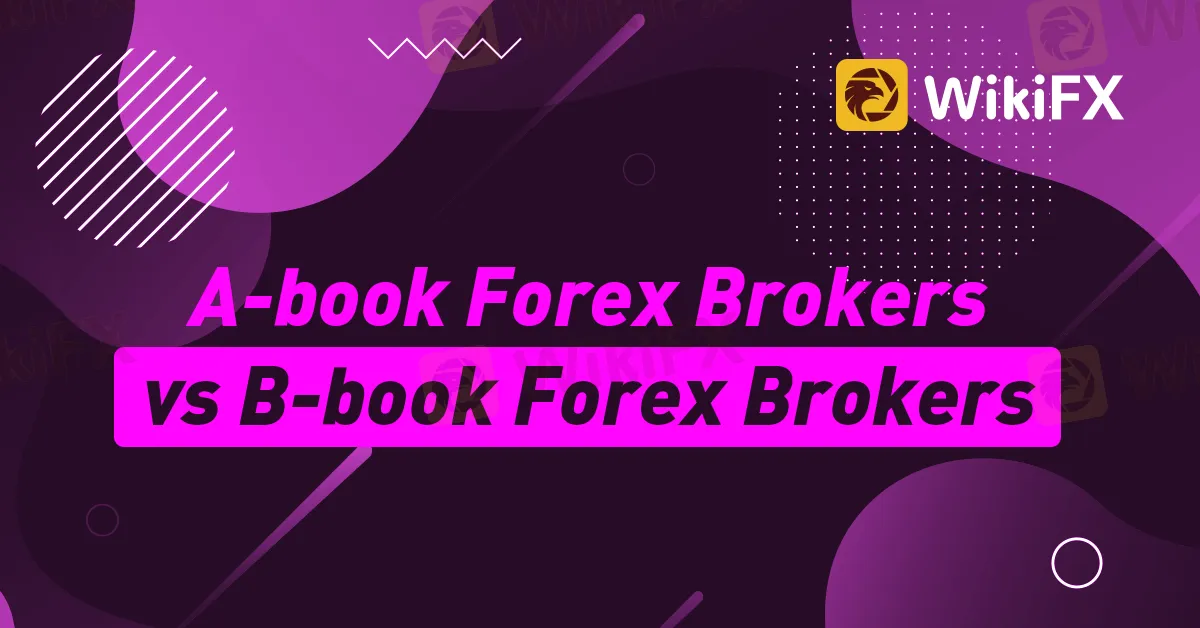简体中文
繁體中文
English
Pусский
日本語
ภาษาไทย
Tiếng Việt
Bahasa Indonesia
Español
हिन्दी
Filippiiniläinen
Français
Deutsch
Português
Türkçe
한국어
العربية
A-book Forex Brokers vs B-book Forex Brokers
Abstract: In the forex world, you may see some brokers called "A-book" and others called "B-book" brokers. In this article, we will analyze what these two types of brokers are and what the differences look like.

About A-book and B-book
To understand what A-book and B-book brokers are, we must first understand A-book and B-book. A-book and B-book refer to the way that brokers distinguish and separate their clients based on the degree of risk associated with each clients order. There is no exclusive A-book forex brokerage or B-book forex brokerage.
About A-book forex brokers and B-book forex brokers
These are the forex brokers that routinely pass on their clients‘ orders for fulfillment in the interbank market or other external execution venues. They could sum up the traditional definition of a brokerage: they source the liquidity for their clients’ orders and pass these orders on for other entities to fulfill. They act like facilitators of these transactions. The closest brokerage model to the A-book forex brokerage model is the STP brokers. However, this is not to say that market makers do not routinely carry out A-book order fulfilments.
Now, what about the B-book forex brokers? As you may have guessed, the market makers always have the B-book system in operation. Remember the 95% of traders who are not usually profitable as forex traders? Well, these are the traders lumped into the B-book liquidity bucket for in-house order fulfillment by the brokers dealing desk. The B-book forex brokers routinely use their in-house dealing desks to fulfill such orders, usually by taking a counterparty position to the trades of these clients.
Difference between the two
The difference between the A-book and B-book forex brokerage model is pretty simple. The A-book utilizes interbank market executions for clients orders, while the B-book process leads to internal order fulfillment without the usage of the interbank market.
A-book: You are trading with the banks and you have various options at transparent pricing. The broker provides the software and access to the interbank market.
B-book: You are trading with the supposed facilitator.

Disclaimer:
The views in this article only represent the author's personal views, and do not constitute investment advice on this platform. This platform does not guarantee the accuracy, completeness and timeliness of the information in the article, and will not be liable for any loss caused by the use of or reliance on the information in the article.
Read more

Breaking News: Trump Announces 50% Import Tariff on Copper and 200% on Pharma
US President Donald Trump has announced a 50% tariff on copper and copper product imports to the country. He further warned that the import duty on pharmaceuticals can rise up to 200%. Read this to know more details.

How to Tell If the Forex Market Is Good to Trade Today?
Wondering if today is a good day to trade forex? Learn how to evaluate market conditions using volatility, session timing, technical clarity, and economic news—without relying on guesswork.

Top Benefits of Forex Cards
Forex cards enable you to make seamless transactions in foreign currencies when travelling abroad. Check out this guide to learn the benefits of forex cards in detail.

Mule Accounts: The Secret Weapon Fake Forex Brokers Use to Dupe Investors
Explore this story where we have highlighted how fake forex brokers use mule accounts to dupe investors.
WikiFX Broker
Latest News
America's Deficit Reckoning: How the U.S. debt spiral could spark a crisis
Treasury yields hold steady as Trump extends tariff deadline
Gold Prices to Fluctuate This Week Amid July 9 Tariff Deadline, Fed Policy
FCA clarifies expectations on bullying, harassment and violence to deepen trust in financial service
XS.com Expands Global Reach with Landmark Kuwait Launch
10 Unlicensed Brokers Exposed – Check Now to Stay Safe!
Exposed: Ibell Markets - A Scam Broker That Does Not Allow Withdrawals
Asia-Pacific markets mostly rise as investors assess Trump's steep tariffs
MT4 vs MT5: A comprehensive comparison in terms of functionality
Top Forex Trading Strategies for the London Session
Currency Calculator


